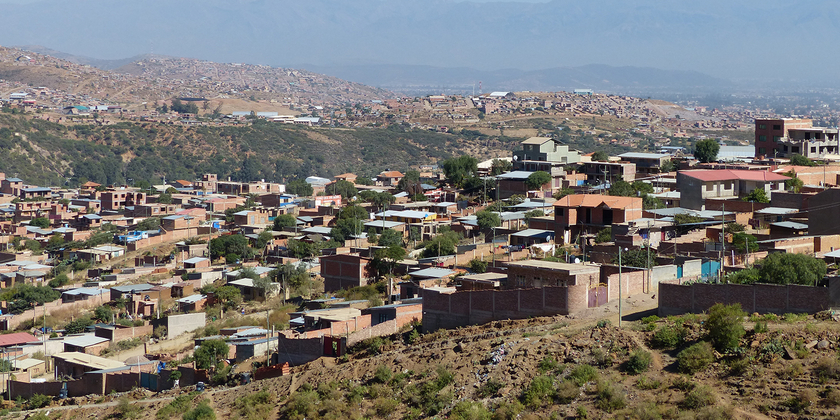Sandec
Sanitation Planning in Secondary Towns

Sanitation planning for secondary towns is one of the research topics of the Strategic Environmental Sanitation Planning group. Our work focuses on providing planning and programming solutions for secondary towns that are characterised by rapid population growth, a lack of environmental sanitation infrastructure and services, weak institutional settings and financial base. Secondary towns in low- and middle-income countries need special attention in terms of capacity development and structured, simple guidance for providing better urban sanitation services. The objective of this three-year research project is to provide state-of-the-art guidance for urban environmental sanitation planning and programming in selected countries: Bolivia, Nepal, India and Malawi. We aim to gain insight into the planning of urban sanitation solutions in secondary and small town settings that would be applicable in similar settings in the selected countries. This research is funded by the Global Water Initiatives of SDC and aligns with their overall objective of providing universal, equitable and adequate access to water and sanitation.
India
In India, our research is aligned with the Citywide Inclusive Sanitation (CWIS) approach. Therefore a number of Master thesis topics under each of the CWIS principles was carried out: (1) criteria for mix of technologies, (2) costing and planning sanitation interventions, and (3) linkages of urban sanitation with environmental and public health. Four SFDs for Coimbatore, Mysore, Chennai and Bangalore were created and made available in the worldwide SFD portal. Another key aspect that was explored were the differences between Mega cities and Secondary cities using Social Network Analysis and its implications for sanitation governance. The World Banks’s beta version of the CWIS Costing and Planning Tool was also validated in the secondary city of Leh.
Our partners in India included :
- GIZ
- World Bank - Global Water Practice
- CDD Society
Some outputs on these that are available here or on request are :
- SFDs - Coimbatore, Mysore, Chennai and Bangalore
- Narayan et al., 2020 – Social Network Analysis for WASH - Sanitation Governance Mega cities vs Secondary cities
- Reymond et al., 2020 – Governance Arrangements for Scaling Small Scale Wastewater Treatment in India
- MSc Theses of Anant Mitra (1), Riddhi Dutta (2), and Clifford Navamany (3),
- Evaluation of World Bank Costing Tool
Partners



Nepal
The secondary towns’ research in Nepal is partnering with the Asian Development Bank-funded Small Town Water Supply and Sanitation Sector Programme (STWSSSP Phase III) and the Department of Water Supply & Sewerage Management (DWSSM). Since 2016 we have validated a number of state-of-the art planning and analysis tools and their applicability to small town sanitation planning in two towns in the Terai: Tikapur and Kohalpur. These tools include:
SaniPath, a new health risk assessment tool
Google Earth applications for spatial analysis
Faecal sludge management diagnostic tools
Citywide sanitation costing tools
We have supported and finalised two City Sanitation Plans: the Tikapur City Sanitation Plan (approved in 2018) and the Kohalpur City Sanitation Plan (approved in January 2021). A new faecal sludge treatment plant (the centrepiece of the CSP) is now under construction in Kohalpur.
Currently we are co-developing with our local partners SaniChoice, a capacity building and decision support tool that enables informed Sanitation Technology and System Choice for urban sanitation planning. SaniChoice will be disseminated and tested in a selected municipality in the Kathmandu region in 2021/22.
Partner

Bolivia
In Bolivia, the SESP group is supporting the GAM project (Gestion Ambiental Municipal) of Helvetas, CSD Engineer SA and AGUATUYA, with applied research on sanitation planning for small towns and peri-urban areas. The project aims at improving the health of the vulnerable population in medium sized cities (urban settlements with approximately 5.000 and 50.000 inhabitants) in approximately 20 partner municipalities in the four following regions of Bolivia: Valle Alto de Cochabamba, Chichas de Potosi, Chaco and Titicaca Lake.
The collaboration focuses on developing integrated sanitation service solutions for peri-urban areas or neighbourhoods that cannot be connected to the main sewer networks. Another important component is the capacity-building of project staff in participatory sanitation planning.
Feasibility study of a sanitation system based on UDDTs
The first applied research focussed on the assessment and further development of a management scheme for the numerous urine-diverting dry toilets (UDDTs) in Arbieto, a municipality of the Valle Alto de Cochabamba. Organisations have provided households with UDDTS, but have failed to implement related emptying services. As a consequence, the UDDTs are not used as planned, which has led to the failure of the system. This case is typical in Bolivia and other parts of the world and this study is aimed at understanding users’ perceptions and defining service scenarios. These were discussed among representatives of the GAM project and from the Municipality of Arbieto.
Partners



Malawi
In Malawi, the SESP Group is collaborating with the Polytechnic in Blantyre on the assessment of sanitation services in the town of Luchenza. The final output is to develop a Malawi specific sanitation planning and management framework, based on the CLUES planning approach, that identifies challenges, bottlenecks and opportunities for small town sanitation services in Malawi.




